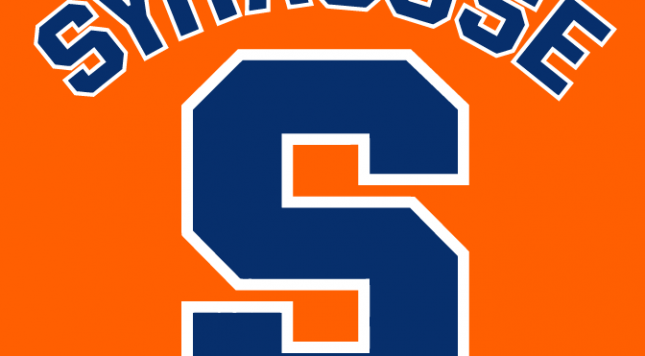There are two main angles to explore in the wake of Wednesday’s announcement that Syracuse men’s basketball program will not participate in any postseason event in 2015.
In case you missed it, Syracuse self-imposed a postseason ban in response to an ongoing NCAA investigation into the program. Orange fans can rightly say that the NCAA’s constant, lingering presence around the program has been the epitome of inefficiency, a typical more than aberrational example of how the organization conducts its business. As true as that might be, however, it’s a different conversation from the one we’re about to dive into.
However right or wrong the NCAA might be in this case, it’s clear that when a program self-imposes a punishment, it acknowledges a certain degree of waywardness in relationship to rules and policies it agreed to follow as an NCAA member institution. What is worth discussing today is the extent to which schools should be allowed to self-punish, when they should be allowed to do so, and what this should mean for the athletes at such programs.
*
What is easily the most obvious “story within the story” here is that Syracuse self-imposed a punishment at a point in time when the Orange’s NCAA tournament chances were less than great. Syracuse definitely had (past tense) a shot at playing its way into the tournament. A back-loaded schedule gave Jim Boeheim’s team the ability to rack up quality wins and boost a “blah” resume that had a win over Iowa counterbalanced with a bad loss to Clemson… and very little else. Yes, Syracuse had a chance to play its way into the field, but the odds of the Orange getting the job done against the top teams in the ACC were fairly low. Nothing about this team’s performance in ACC competition — especially Tuesday’s lucky escape at home against a Virginia Tech program in complete rebuild mode under first-year coach Buzz Williams — pointed to a happy ending for Syracuse relative to the Big Dance. ESPN’s first Bubble Watch put the Cuse at the back of the line among ACC bubble teams.
The timing of Syracuse’s self-punishment is very much at issue. First of all, the punishment calls to mind the University of Miami’s decisions (plural) to remove itself from a bowl game only at the end of multiple college football regular seasons. In 2011 and 2012, Miami drifted through a mediocre regular season (the Hurricanes won no more than seven games in either campaign) and then announced withdrawal from bowl consideration just days before Thanksgiving.
Let’s be fair to Miami about the 2011 self-punishment: In 2011, too much smoke was billowing from South Florida for the Hurricanes to have any right to expect a postseason invite of any kind. Even if Miami was 9-3 or 10-2, the Canes didn’t have enough leverage to push their way into a higher-tier bowl game.
However, in 2012, let’s exercise some realism here: Had Miami been 10-2 and worthy of consideration for a premium bowl game, it’s hard(er) to imagine the program self-imposing a bowl ban in the latter half of November. It was so much easier for the program to tack on another bowl ban only because the 2012 regular season didn’t pan out as the Hurricanes hoped it would.
Much the same is true with Syracuse here, as plenty of people on College Basketball Twitter took time to say on Wednesday:
https://twitter.com/BPredict/status/563137943058280448
Yes, NCAA governance and NCAA methodology should not be ignored or minimized as issues that need to be dealt with here. This is not and should not be a one-way conversation in which the focus is only on Syracuse, to the exclusion of the NCAA, an organization which needs to be made more accountable in its own right.
However, this issue of self-imposed punishment has to be given more and better parameters — one can say this regardless of what one might think about the NCAA.
Can we agree that self-imposed punishments in response to long-term ongoing investigations need to be made before seasons begin, ideally a month? (Punishments in response to breaking or abrupt developments would constitute an appreciably different problem.) This would free up players such as Rakeem Christmas and Trevor Cooney to seek transfer options if they wanted to. This is the decent and right thing to do for the athletes. Now, Christmas is boxed in, his senior season headed for a premature conclusion through no fault of his own.
Can we agree that if it is politically difficult for the NCAA to set in place a firm “one month before the season” policy on self-punishments, the organization should at least move to then create certain combinations of penalties and incentives to get schools to be more proactive about this sort of thing?
Syracuse fans might think the NCAA is in the wrong here — again, that’s a discussion worth having. Yet, should we really have to deal with the sorry spectacle of a program punishing itself late in a disappointing season? That’s a discussion worth having, too, and some feel that the humiliation of having to play in the NIT would be worse for Syracuse than just being able to duck the postseason altogether:
YOU'RE RIGHT NCAA. WE WERE BAD. TO MAKE UP FOR IT WE PROMISE WE'LL DECLINE THAT 8 SEED TO THE NIT AND NOT HURT RECRUITING OR NOTHIN'
— No Escalators (@NoEscalators) February 4, 2015
Yes, Syracuse proactively punished itself… when the Orange just happened to be a bubble team and not the top-three NCAA tournament seed they were a year ago… or the No. 1 seed they were in the 2012 edition of the Big Dance.
Can we improve some policies here? One would like to think this could happen… but of course, this is college athletics we’re talking about, so everything feels very much up in the air.

